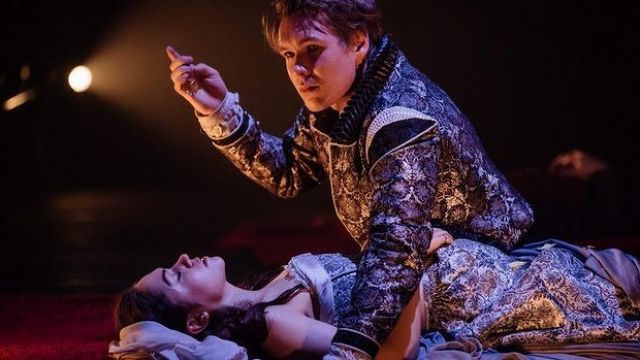Romeo and Juliet
Heads and maidenheads allude to murder and rape. That is made clear by the testosterone-fueled speech given a bearded Capulet servant, setting the tone for the play from the outset. Peter Evans’ take eschews simpering romance, restoring Romeo and Juliet to its violent and lustful essence. The servant is a composite of Shakespeare’s characters Sampson and Gregory, and what was dialogue between two becomes a spoken inner monologue full of sex, rage and brittle bravado. The speech is just one example of the sheer genius of the editing.
The performances are superlative. As in Bell Shakespeare’s Hamlet of last year, the mood swings from clowning to deadly serious in an instant. There is a violent undercurrent which bursts through at moments of tension, most evident in Lord Capulet (Justin Stewart Cotta) who appears as an abusive father, his fond affection giving way to rage at the slightest hint of dissent. Michelle Doake’s manically comical Nurse reminded me of characters from Blackadder, while Tybalt (Tom Stokes) was sheer unbridled aggression. The sex and death theme is reflected in the glorious design of dark, rich, silky fabrics in carnal reds, oranges and deep, earthy grey-browns. Set in the late 16th Century, the set and period-influenced costumes are exquisitely detailed.
This production explained to me something that I’ve always found unrealistic, namely how Romeo and Juliet fall in love at first glance. The answer suggested here is that they don’t. Romeo (Alex Williams) is a hormone-filled idealistic teen while Juliet (Kelly Paterniti) is an innocent, infatuated fan-girl, and what they think is love really isn’t. In emphasising their youth, naivety, foolishness and confusion, the production makes their actions understandable. That said, it could have lead to one flaw. Kelly Paterniti’s Juliet is authentically and painfully 13-years-old, but her lines were often delivered in an unnatural declarative way. I don’t know whether this was in response to direction, a function of projecting her voice at child-like pitch and cadence, or taking a cue from the Nurse’s far more exaggerated character. Although this became far less noticeable later, Juliet's first scenes were a little stilted and lacked nuance. Paterniti's voice performance contrasted with her actions: excited shrieks, giggles and swift movements, which were timed well and perfectly in character.
I highly recommend this intelligent and meticulous interpretation.
Cathy Bannister
Subscribe to our E-Newsletter, buy our latest print edition or find a Performing Arts book at Book Nook.

